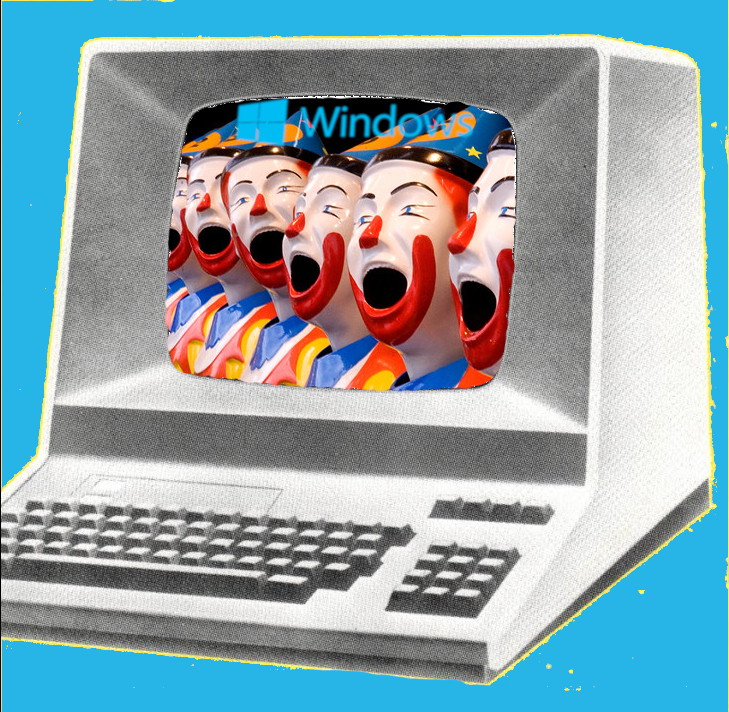Clown Computing
Reprinted with permission from Dr. Andy Farnell.

Figure 1: "Let the sideshow begin, hurry, hurry step right on in. Can't afford to pass it by, guaranteed to make you cry." – The Stylistics
Send in the clowns
That spooky guy in the hoodie with the green "hacker" screen has been the emblem for cybersecurity far too long. Forget him. If you want an image of modern computer insecurity then picture a big bucket of confetti perched on top of a ladder, balanced on an unsteady unicyclist's top-hat whose accomplice is about to smack them in the face with a plank, having slipped on a banana skin.
It is elaborate. Unlikely. Tragically flawed. All a show.
As the word Clownstrike enters popular parlance, this month has seen custard pie all over the face of the tech world. July was another cavalcade of horn-honking calamities from the global Microsoft meltdown to the breach of every single AT&T customer record, to Google just 'losing' 15 million passwords down the back of the sofa. Business as usual. What gives?
Welcome to the world of "clown computing". Roy Schestowitz at Techrights likes this play on words to describe the widespread misuse of "cloud computing" (aka. your stuff on someone else's computer). But I think it's more than that. What we're seeing is a circus of incompetence overtaking so much public facing computing. What can be done, and whose incompetence is it? Does it matter?
Why the circus?
A clown is a figure in whom we are supposed to see ourselves and others reflected. In drama the fool brings the important messages. From the Greek Chorus to Shakespeare, the fool reveals the "everybody knows" truth no-one dare speak.
Dramatically, the fool is there for people who aren't paying close attention but just enjoying themselves on a quite different wavelength. A story is told on many levels. Very much apropos our present moment, clowns are taking to the stage of technology. This may be a good signifier if we value positive change.
In digital technology we've snagged our pantaloons and as we run around in circles things unravel;
- long-standing technical debt
- accumulated complexity
- loss of knowledge
- accumulation of nonsense
- loss of fitness
- and a weakening of representative power
Enjoying the absurd
How can clowns help?
First and foremost clowns are funny. Music and laughter are what we live for. They get us outside of ourselves, so we can see and enjoy the ride. But what is funny can also be painful and impossible to avoid as an experience.
Entertainment, of which politics has become more a part nowadays, has a functional role in all societies. Clowns represent The Absurd. Things that get too complex become absurd. They become hallucinations, running haywire. That has happened with computers. A medley of convergence, ubiquity, and machine learning has kicked technology itself into a zone of turbulence where we have a complexity crisis, which in the simplest words is a situation where nobody is able to take in hand or in mind what is going on any longer. Events become unpredictable.

Figure 2: "The absurd is the essential concept and the first truth" – Camus
The best coder or project manager can hold in mind a few tens of thousands of lines of code. Today we have safety critical systems with tens of millions of lines, most of which are forgotten and have not been seen by human eyes in decades. A single misplaced comma in any one of them could be the next world-stopping bug.
In these conditions superstition and guesswork retakes the ground from reason. We stop understanding the things we have built. We build defences around them to protect ourselves from our own creations. This is evident in our inability to formally design, test, understand and tame very large "AI or emergent" models and code-bases. We've reached some limts of software engineering, beyond which further ambition is reckless.
It's also why big companies like Volkswagen, Boeing and Fujitsu lie about their products. What they really want to say, but cannot out of embarrassment, is "We don't really know how this stuff works any more. People cost money and that's an old project".
If you like the stories of Franz Kafka, the essence of Joseph K.'s Trial is not mere farce, or infuriating logic as in the vein of Heller's Catch 22, nor even tragedy like Charles Dickens' stories of the exploited and miserable poor. It is about facing the absurd. The Absurd tears up the fundamental meaning of human experience. It also suggests, and sometimes allows us to redefine and rebuilt it in any new way we like, though historically such projects have often ended in horror.
But the absurd demands reconfiguration. It demands a new, less dizzying perspective. It affects the powerful and the weak, the rich or poor, and the wise or stupid all alike. It unleashes all the contradictory, incongruous, impossible things we have swept underground through expediency, or love of some ideology, for too long. They burst out, all crawling at once like a shop of horrors to catch up with us. On an individual scale we process that through dreams. As a society we process it through art and cultural change.
To find a safe path through that change we seek concrete, objective knowledge. That is the light we should be able to shine and chase away the bugs in the shadows. It is the operating manual. It is the well known, seminal scientific paper. It is the seasoned and respected expert. It is the dependable and incorrupt institution. These things seem misplaced. Where are they? Suddenly there's no script, only ad-lib.
Nonsense accumulates in all cultures. It is Phlogiston theory or Phrenology. It is every fad diet and economic theory that in 10 years will be laughably 'discredited'. It is perhaps; ideas without real lasting utility. Lately computer science has been eclipsed by marketing slogans and more or less empty concepts like "cloud computing", "blockchains", "the metaverse", and of course "AI".
These are buzzwords for selling stuff to people, but behind them are real and complex systems, code and mathematics. The public are isolated from that scientific reality not because all the concepts are so terribly hard to communicate (some are really mind-bending) but because at a different level they serve, in Wittgenstein's sense, to stand-in as tokens of commonality. They allow people without knowledge (but with money and power) to give their money or trust to people with no money but with knowledge. They define name-spaces, reduce the thinking journalists need to apply, and excite venture capitalists into parting with their money. Where it is profitable, people will build their own special fantasies around nonsense ideas - and get very stuck on them.
The clown challenges nonsense. Because the clown is nonsense. You can't bullshit a bullshitter. The clown is Toto the dog, pulling at a corner of curtain in the laboratory of the mighty Wizard of Oz. It annihilates pretence. Out of this iconoclasm comes clear new truths, which were obvious all along but clouded with smoke and mirrors, like "No AI can be trusted because all AI is by definition deceptive - it is artifice". Hence any question about whether one can "trust" AI is already moot. But people rarely accept such truisms unless packaged in drama or poetry.

Figure 3: "Busted!"
The theatrics
Clowns are actors, like mimes, mannequins, puppeteers and dancers. Since primitive times they express what is put into them, as emotions, through words and music. They are observers, and sentinels who serve in rituals of the theatre; in sacrifice (of icons), drinking, smoking, feasting, letting go of emotions, story telling, exploring moral dilemmas and politics. Ultimately this comes from the environment, from the community, and the audience sees something reflected back. Entertainment is a democratic force for connecting and confirming common truths.
But actors are dangerous, and since time immemorial philosopher kings have been at odds with the poets. Entertainment is no pacifier. Clowns and gladiators stir up trouble. A great deal of modern technology mediates these old entertainment rituals. They play out on platforms owned by the kings, who choose what scripts, actors and stories may have the audience. They want safe ones.
Today our stages and circus tents are technological. But technology has moved against us to the extent we have disrespected it, taken it for granted and forgotten the responsiblility of owning and maintaining it. Rather than feeling joy about technology, we now absorb its message of fear and control. It tells us depressing stories. It tries to tell us what to think. Even our favorite games, are war games.
Of course technology should serve humans, as a moral imperative. We want a show that makes us feel good and connected and whole. If technology does not serve humans we say it has failed its fitness for purpose. That's a big deal in engineering and from a Darwinian stance, since it means we're no longer evolving.
Every real engineer knows the dangers of machinery. If limbs and clothing get caught in the wheels we built, we become Chaplin's clown character tossed from one situation not of our making to another. The stage has usurped the actors.

Figure 4: "Nothing is so dangerous as being too modern; one is apt to grow old fashioned quite suddenly." – Wilde
Unlike Weber's social machinery - a bureaucracy seen as necessary to "manage and control" - the new machine asks only that we surrender all control to it. The gods of "convenience and efficiency" demand we give up on control, on reality, and embrace blindness, forgetfulness and the forces of "the night". This can bring out the worst in our fantasies now acted out in cyberspace.
Festivals of chaos are an ancient cyclical tradition that are supposed to be refreshing. Clowns bring anarchy and chaos, so unruly that even the ringmaster has to kick their backsides to get them off stage. Clowns also symbolise violence. It may be a zany, slapstick violence, or a more calculated meanness. Tragic violence is "iatrogenic" - the clumsy, inept, violence of the fool that "only wants to help and make things better"
The stage also needs villains. We are deep into a period where digital technology respects no established institutions. So we have a great choice of villians. Our baddies today are literally modelled on comic-book Bond cliches, with mountain mansion bases, superyachts, sharks, lasers and minions. Cryptobros have their own space fleets and dance a merry jig all over the banking system. Mega-rich tech "celebrities" incite civil war and mock governments. Blatant cybercriminals operate with impunity as "legitimate defence companies".
People love to see these figures made clowns. We need to see villains knocked down a few pegs, so in the digital age we've seen Anonymous clowns wearing the signature V-for-Vendetta mask, a culture of venting through trolling, and actually it's a golden age of parody and satire.

Figure 5: "The greatest violence in our society is ignorance" – Emma Goldman
Who are the real clowns?
It's easy to point and say that the "people running things" are the clowns, and we who get to sit and laugh are the 'audience'. Consumers.
But we are participants. Aren't we also fools, tripping over the buckets and stepping on rakes of inappropriate trust, broken systems, fundamental misunderstandings about technology?
And as we hand over more and more control to non-humans, where are those supposedly "in power" to account for anything anyway? Can you truly laugh at, or fear a mere machine?
So clown computing is all around us as the bric-a-brac of apps and digital apparel. Clown computing happens when we download an "AI app" to fake selfies of our imaginary adventures. It happens when we chase 'likes' from 'friends' on social-control media run by extremist billionaires we despise. Clown computing is when we get into an emotional relationship with a chatbot. It is technology that makes fools of us.
Did we not say "Technology will save us"? Didn't we praise Google as "our friend"? Did we not give mind-sapping smartphones to our children and become apologists for Facebook? Didn't we eschew cash for contactless? Didn't we buy into becoming tracked like farm animals during the pandemic, and embrace the fake "necessity" of a plastic life lived inside 6 inches of "black mirror"? Didn't we replace messages from our friends with "feeds" from an algorithm?
So who are the clowns, really? Are we cartoon cats, dropping anvils onto our toes?
The clown then is also a tragic, bewildered figure, lost in a cloud of confusion. The response is always "Education, education, education!". But education in what? In critical thinking about technology? In basic political science on the age old trickery of bread and circuses? Some people would rather lose a limb than live a day without their Candy Crush.
The pitiful truth is that those in power do not want people educated about communications technology. That scares the crap out of them. All fortunes and empires are built on private knowledge. The bad news for them is that we probably won't be able to sustain technology going forward, without some major devolution of design, production and ownership. In a game of brinkmanship incumbent power has allowed concentration and monoply to build, dodging intervention right up to the point where ignorance around technology is an immediate threat to everything, including their own positions.
Education is just one rather ragged tool. Thirty years in higher education showed me without doubt that we've destroyed it. We made it partisan, unaffordable. We commodified knowledge and reduced universities to platforms that are unfit for teaching and learning. We can no longer catch up with the needs of new digital literacy and vocational capability vital for maintaining things like reliable software engineering, cybersecurity, freedom of speech, truthful news, privacy, and functional law and politics.
We thought digital technology was going to somehow, magically "sort it all out", like a benevolent friend. That wishful thinking still lurks in hardcore AI adherents who imagine "bootstrapping a singularity", a process of advancement that would magically unfold by itself and serve all human needs.
In reality, technology is only occasionally a friend. Sometimes its a map and compass. It is also a beast we hoped to tame and tether to. We let go of the reigns and now digital technology is a bear loose in our own castle. As beast it need not assume the form of a murderous rogue AI. It merely has to become a friendly magic fairy we depend on but no longer understand. When it becomes "something nobody can control at all", it realises the slogan of the "technological determinists" of Silicon Valley for whom progress is a wave to be surfed into Hell, in the style of Maj. T. J. "King" Kong in Dr. Strangelove or Lt. Doolittle in Dark Star. But who rides who? Aren't "things in the saddle, and ride mankind."

Figure 6: "Yeeee Hawwww!"
So a clown is also a tormented figure, never avoiding the same swinging plank. He's always the butt of "things", of unfortunately placed banana-skins, never able to exercise will and take control. If he is really tragic, as Mary Shelley painted him, he's tormented by his own creations.
The clown gets stuck in loops, like Sideshow Bob in a field of rakes he cries out in madness for "a different outcome", some semblance of sense, for logic. He gesticulates in impotent rage, having become a chaotic spectacle of hopelessness, indignity and injustice. To the extent that social control media provides a Society of Spectacle as Debord put it, it's a safe container for our clowning where we can be monetised by advertisers.
A place to hide
Clowns represent a mask, of hidden or disguised true feelings and intentions. Ronald McDonald is the acceptable face of the unacceptable, of pester power, of abattoirs and child obesity painted over in gaudy candy-striped primaries. Technology in providing "a way of not having to experience the world", as Max Ernst put it, shields us from discomfort.
Masks are an important staple of culture. Since ancient worlds, clowns and jesters could freely criticise power without fear of retribution. Competent power sees far too valuable a source of wisdom there. For the wise king, the clown is a trusted lieutenant. So by proxy we mock power through its failing machinery. When multi-trillion dollar mega-corporations fuming with puff and bluster cannot keep their own pants up, it reminds us that we ought not lionise what - at the end of the day - are just a bunch of very ordinary people like us trying to spin way too many plates on sticks.
Clowns are not weak
In ordinary reality, clowns - as professional performers - are physically elite athletes highly adept at choreography and timing, masters of conjuring, actors and dedicated practitioners. Their clumsy stupidity is a brilliant show. One can even imagine a clever clown making it to become president.
There are no "evil clowns". Just clowns. For the role contains, joy, fear, foolishness and cunning, care and malice all wrapped-up in proportion. Here the clown shows us duality and volatility.
The Joker is of course the go-to icon, but for my money Joe Pesci plays a much more terrifying Tommy DeVito in Goodfellas, always the happy clown surrounded by nervous laughter, but never turn your back on him or let the joke be at his expense.

Figure 7: "A good fella?"
So maybe a little more respect is due to clowns and the messages they bring to us.
By the same token, perhaps we should pause before mocking the failures of modern technological power, as it's ineptitude might be part of its schtick, a display of contempt. We might also look on our own clownishness as a latent power. To appear bewildered - all the while hiding the ability and intent to master fate - is the skill of the patient clown. For best comedy effect, timing is everything.
In the end clowing is not a sustainable state of being. It's a state of transition. Heightened emotions are exhausting. After the show the actors take off their masks having achieved something… to move the 'big story' forward for everyone. They return to cooking and cleaning and living like everyone. So at the close of the night the ringmaster must clap his hands, and the fools and jesters disperse. There is a time for fun. In the morning, when the ale has worn off, there will be serious things to attend to.

Figure 8: "Enough sillyness!"
Swish the curtain
So "Clown Computing" is an interesting phrase to describe current events. We can laugh at rampant incompetence but also let's be aware of our own foolishness in revering what is ordinary and faulted.
Technology is no God. Or truth and way. It's often entertainment, if we are careful not to amuse ourselves to death. It's frequently useful for finding, organising and making things. But stepping over the line into idolatry begs iconoclasm. It deserves iconoclasm.
There are many ways of framing the evolution of technology within a society, its governance and the elements of social justice that must accompany it. This horrible image of us as fools, tripping on our own over-sized shoes and stumbling forward is a powerful and useful one, since the narrative around technology is too dominated by prickly sorts who are unable to know what is really 'in the air'.
With "AI", the story of us as fools gets more interesting. Will we be further directed by the hand of tricksters? Or will creators become fools, completely failing to restrain Promethean powers as AI becomes the new Joker in town? How do we fortify ourselves against the absurd?
Fear of new monsters is palpable. I don't think people have felt as pessimistic about technology since the creation of the Atomic Bomb. I regularly read sad testimonials from fellow hackers and computer scientists saying how they feel "ashamed" of the direction technology has taken and of their part in it. However we look at it there's a monumental task ahead to reach a more mature and agreeable stage of technological evolution.
We may become Chaplin's "lil tramp", lost in the city. Or we may go the way of Wells' Morlocks, sophisticated savages feeding on our own kind. But we did not arrive by Time Machine in these Modern Times. We did not get here without a map. We walked and stumbled here. We can see where we are, how we got here, and the paths forward. We're not victims of fate in a science fiction novel.
When chunks of society collapse we are all to blame. As teachers, lawmakers, developers, administrators… Sure, Microsoft and BigTech is a joke. Jokes are serious things. We must heed what they tell us and see when the Emperor's pants have fallen down. This is our show and our stage. We can set the next scene.
What does this mean?
So I am asked by some of our proof readers; "So what's the big takeaway Andy? This cultural stuff around cybersecurity is all very interesting, but how does it turn into action?"
Firstly. I would say that cybersecurity is a very serious business. People's lives and fortunes depend on what we do.
But taking things too seriously works against us. There are many impostors and salesmen who hang around in cybersecurity, act all serious, wear a big frown and spend billions of dollars. But they are full of shit. They rely on people taking them seriously (on false authority) and are not used to being challenged as they throw away the family fortune on a bag of magic beans.
- call out arrogance and stupidity
We need to call defective people out. It behoves ordinary, honest intelligent people, sysadmins and developers, but also users of systems, to speak up against the absurd. Tenaciously chase down claims. Demand data and proofs. Do not let people hijack the name and cause of computer security for their own cheap games.
- pity the fool
The second thing is that everybody makes mistakes. Expect mistakes. Cybersecurity is hard and stressful and filled with buckets and banana skins to trip over. We should be kind to individuals who screw up. They should have support, and layers of backup. Their superiors must be accountable. Make sure that's written into policy, and if it's not then call-out those hiding behind tricks to privatise profit but make risk public.
- embrace the fear and madness
Make peace with the clowns. Do not fear the absurd. Accepting it is a gateway to more solid ground. Real progress is through radical self-examination, however painful, toward improvement.
Acknowledgements
Appreciation to Techrights readers for thoughts and guidance. To Jodi for the Oscar Wilde. To Kate for thoughts about The Mask. █
